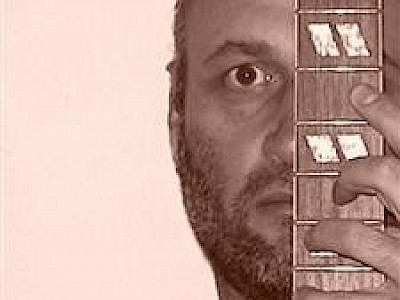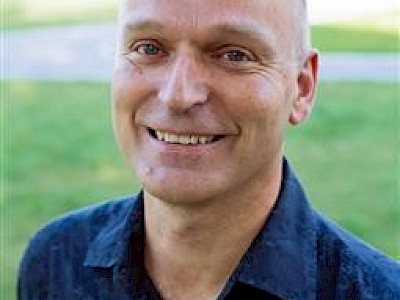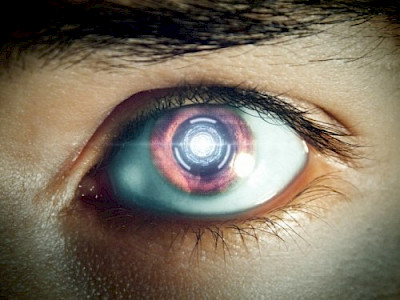We're becoming part machine, part human, should we be worried?
Cyborgs
That we should be walking around as ‘cyborgs’, is not a nightmare scenario for Slaats. “A camera can zoom in and out, and for instance see infrared light. Our eyes cannot. I'm asking my students every year whether they'd have their eyes replaced by such a camera. A few years ago they were still very reluctant, but that's slowly shifting to a more positive view." The debate at Fontys is linked to the VPRO-science programme The Mind of the Universe with Cruz, which airs on Sunday. It’s not surprising that the VPRO is coming to the Fontys campus for this edition: at Fontys we're working at the very cutting edge of human-computer interaction. Janieke Sturm for instance, the leader of research group Humans and Technology.
Empathic alley
Mark de Graaf, leader of research group Interaction Design, works on designing an ‘empathic alley’ in their own school building. The English name of the project, ‘alley’, soon changed into ‘Ellie’ (a Dutch women's name). Ellie will be able to read the emotions of students or employees who walk it. “We still have to decide whether she's going to for instance confront you with your stress or rather comfort you”, says De Graaf.De Graaf says that Fontys likes to be ‘in the vanguard’ of these developments. “In particularly because we're involved from a human perspective. You cannot leave this to techno-nerds who don't consider what their inventions mean for humans. We also have attention for the ethical aspects."
Slaats calls himself a ‘techno-optimist’. 'Upgrading’ your body with chips on cameras? He thinks that's perfectly comparable with piercings or tattoos. “Of course the ethical side of things is not lost on me. For instance, how do you keep this technology out of the hands of the wrong people? But in the end technology does more good than harm”, says Slaats. De Graaf is more careful. “I can conjure up both very good and very bad scenarios”, he says. “I think odds are that we'll be walking around with augmented reality-glasses instead of a mobile phone in a couple of years, because these glasses are much more convenient. But what does it mean if this allows you to effortlessly read peoples' emotions on the street and to manipulate them?"
Imagination
Guest Carolina Cruz, who's working at the university of Arkansas in the United States, above all sees unlimited possibilities for the youngest generations by walking around in virtual worlds through virtual reality (VR)-glasses, she says in the show of The Mind of the Universe. “The limits of virtual reality are the very limits of our imagination. When I see my son of 6 play with virtual reality that really opens my eyes. He gets frustrated when things he expects don't happen. But we just didn't imagine them yet”, says Cruz.
People who get in touch with virtual reality at a young age do have this imagination, and possibly the capacity of holding on to it, Cruz thinks. But she also worries. “If the alternative reality is better than our own, will we live in the alternative one?”
The American scientist Cruz will enter into a debate with, among others, Catholijn Jonkers, professor interactive intelligence at the Delft University of Technology at 20:00 in the canteen of building R5. From 19:00 on and after the debate employees and students of Fontys School of ICT will demonstrate the latest technology that mixes fiction and reality. Visitors can chat with a robot or explore the International Space Station.
Source: https://bron.fontys.nl/we-worden-deels-machine-erg-of-niet/


